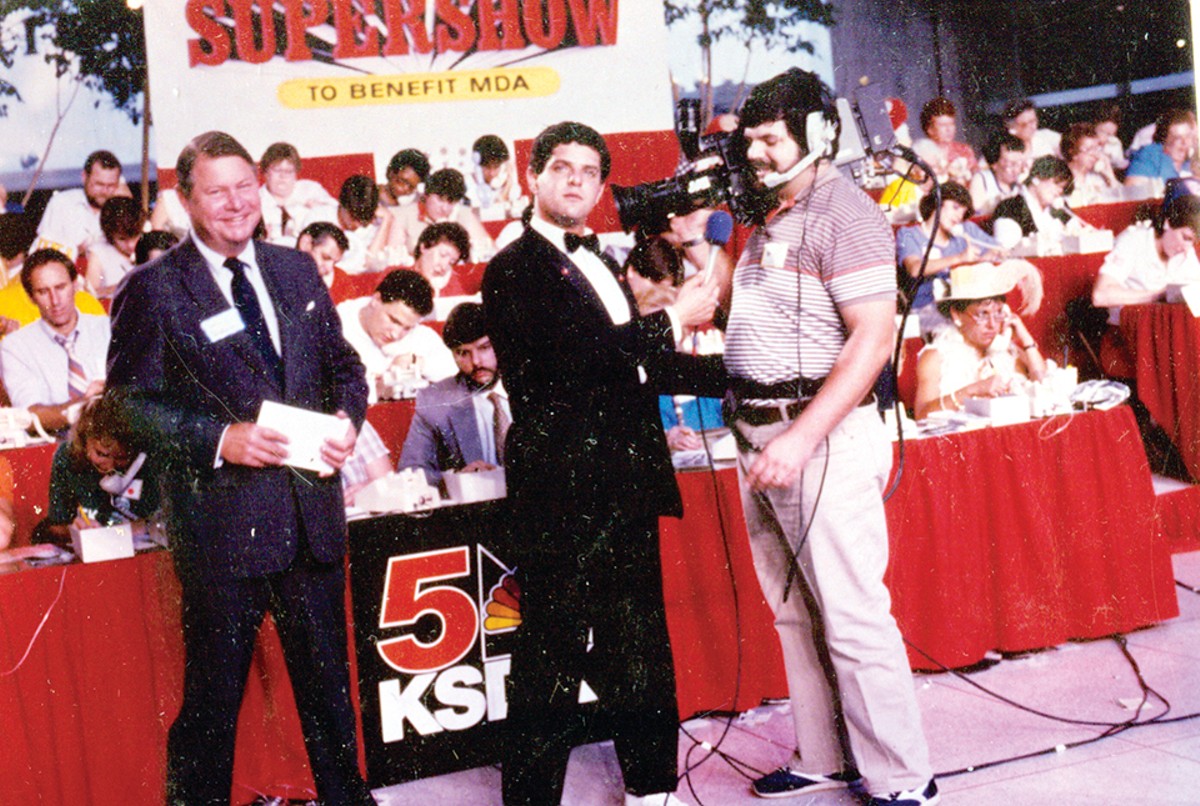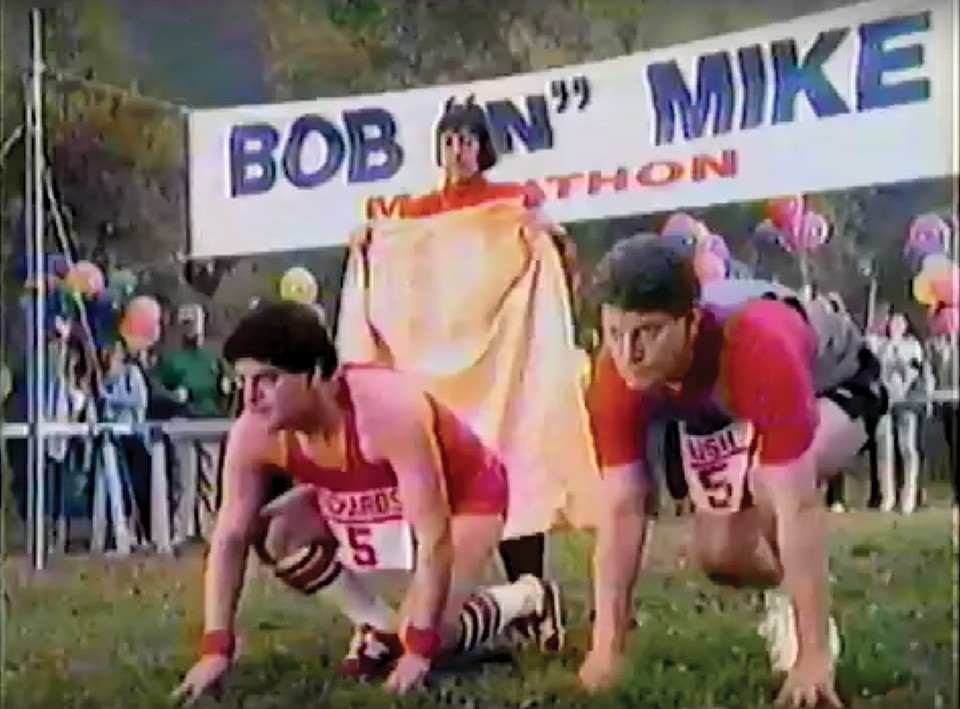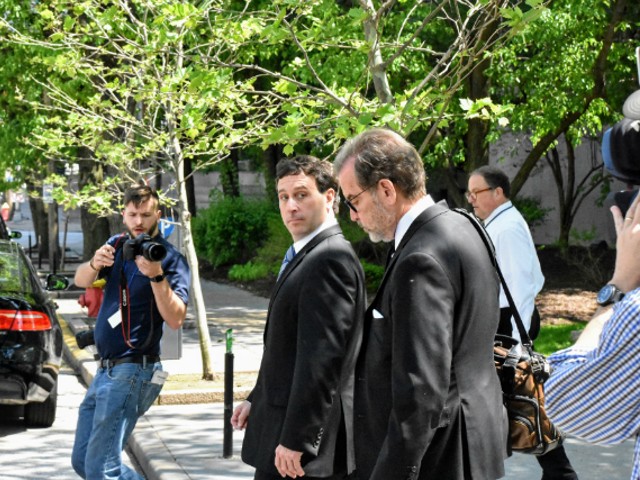On the morning of March 20, 1994, the producer of the Steve and D.C. show got a phone call from a 34-year-old Farmington, Missouri, woman named Donna L. Henry. She wanted to go on the air and talk about her relationship with Bob Richards. The DJs were in the middle of a segment, so Henry would have to wait.
Two days earlier, a short Associated Press story ran in 100 papers and on fourteen news stations describing a protective order granted to Henry by Judge James E. Pennoyer against Richards. The Missouri adult abuse law had expanded only the previous year to include stalking and harassment; Henry played the judge voicemails, showed him more than a dozen letters from Richards and claimed he had repeatedly flown over her home in Farmington in his private plane.
"He was trying to turn the tables and say I was calling him," the Post-Dispatch reported her as saying at the time. "He gets real angry when it doesn't go his way ... Every time I think it's over, something else happens."
Judge Pennoyer granted a temporary order of protection. "It seemed like the guy didn't want to give her up," Pennoyer said at the time.
Henry claimed that she had been in a relationship with Richards beginning shortly after they met in 1992, when he spoke at the nursing home where she worked. She later said she broke up with him for the first time in July 1993; they got back together in November when, Henry stated, Richards assured her he was getting a divorce. Presumably, Henry realized that was not the case, and they broke up again in January 1994.
Joseph Layden, managing editor at the Daily Journal in Park Hills near Farmington pitched the story to the AP in St. Louis on March 17. In the meantime, the Post-Dispatch received an anonymous letter that caused them to start digging into Richards; the AP story broke while P-D editors were discussing internally whether or not to run a story.
The AP blurb, buried on the bottom-right corner of page nineteen under the headline "Court Order Against TV Weatherman," included a comment from Richards. He "denied dating Henry. He said he met her while making a personal appearance in the Farmington area about two years ago and that she had been 'a friend for a while.' Richards said Henry had got angry because he 'had not taken her up on her advances.'"
"'I'm a nice guy, and people that know me personally and professionally know that I desire no ill will on anyone,' Richards said. He added that he is 'very happily married.'"
Stratton got a call from Richards when the news blurb hit. She remembers wondering why he didn't just agree to stay away from Henry — who cares?
"Take your ball and go home," she says. "That's the exact words I told him. 'She wants to file a restraining order? Take your ball and go home. Say, 'Fine."' What are you fighting it for?"
Henry was not having it.
"If I remember correctly, she was really more disturbed by the airplane deal than anything, than even the phone calls and the frequency of the phone calls," Wilhelm says. "And I'm telling you, on that first day, obviously we talked about it, but we didn't do a tenth of the stuff that I heard later that other morning shows did. KMOX, their morning show — they were playing airplane sound effects and making fun of it. Frank O. Pinion was doing all these bits with it, and JC Corcoran, they were all talking about it quite a bit. We really had just mentioned it a couple of times but didn't make that big of a deal out of it. We did read the quote on the air that he said, 'Donna Henry is lying. She's just a crazy fan.' We did read that. And I think that's what upset her."
Steve and D.C. had only been reinstated earlier that year after being fired for using racial slurs. Critics would later accuse them of being the ones who played airplane and accordion noises on air and talking about the scandal incessantly, but Wilhelm insists that's not how it went.
"Through the years, a lot of people have gotten that wrong, and they say — I know that Corcoran, for years, has told people that we hunted her down, and that's not true," he says. "She called us and told our producer who answered the phones at the time that she wanted to defend herself and set the record straight due to him saying that she was a crazy fan."
Once Steve and D.C. were done with their segment, they put Henry on the air a little after 7 a.m. She made a case that Wilhelm admits he had not even considered at the time: Farmington is a small town, and she was now a business owner. It wasn't even that she was upset about the relationship, she told them, but rather that she had a reputation to protect in Farmington.
Henry said, both that morning and later, that she had been the one to break off the relationship.
"My name is plastered everywhere," the Post-Dispatch quoted her as saying on air. "He has almost weaseled out of it."
She made reference to the voicemails he'd left her a few times, and then told Steve and D.C. that, as a matter of fact, she'd play them right now.
"Steve and I [were], I remember, both looking at each other like, 'Whoa, wait a minute, that's more than we bargained for,'" Wilhelm says. "We were thinking, 'Is that legal? Is that gonna be an issue?'"
Henry was put on hold while Steve and D.C. conferred with their producer. They got ahold of the station's general manager and confirmed that it was OK for Henry to play the voicemails. (Missouri is a one-party consent state with regard to recordings.)
"I think we only allowed two messages, but they were so obviously him that we really didn't need any more, you know?" Wilhelm says. "It was scary sounding, it really was. It was him — you know his voice from being on TV for so many years, so instantly you kinda got chills when you heard it start, because it's like, 'Oh my gosh, that is Bob Richards.'"
All told, Wilhelm estimates Henry was on the air for no more than 30 minutes between the two segments. At first, Steve and D.C. didn't think it was going to be a huge deal. Around lunchtime, though, they started hearing rumblings.
"We'd met at a couple of appearances," Phillips says of Steve and D.C. "I know they were competitors. I understood what they were doing in the market. They were very talented guys. What they did, they did very well."
Richards called Phillips that morning, "frantic."
"He said that this was going to ruin his life," Phillips remembers. "And I said, 'Bob, there are politicians, preachers and people in high places that have had worse transgressions. Just let it work itself out.'"
Stratton received a similar call from Richards. "He was in a desperate panic at that time," she says. "Total embarrassment. Horrified, humiliated, the whole bit. I'm not saying that he wasn't responsible for his own behavior, [but] it was pretty terrifying for him."
"Initially our reaction was — 'Sorry?'" Wilhelm says. "I really felt like she deserved to be able to tell her side of the story. Because people tend to believe the celebrity — maybe they're telling the truth, maybe she is a little nutty. And I just remember feeling like OK, I understand that you're angry, but you're probably more angry that you're caught than anything else. And at that time, we didn't know that he had several mistresses going on. We just knew about her. But I felt like he was just angry that he got caught. Now, that was about lunchtime. Later in the day we started hearing other things."
Corbett remembers seeing Richards sitting on the curb behind Channel 5, where the news vans were, smoking cigarettes, even though Corbett didn't know him to be a smoker.
"But clearly there was a lot of turmoil in his life, in his soul, that was going on," Corbett says. "I sat down next to him to talk and offered to listen. 'What's going on? Do you wanna talk?' And he's like, 'No, it'll be cool, it'll be cool.' It was a side of Bob I'd never seen before."
The day before Henry's interview, Richards had spoken to then-KSDK general manager John Kuenke about suicidal thoughts. Kuenke offered to give him time off, which Richards repeatedly refused. He refused for the final time on the afternoon of March 22.
Richards did his regular newscasts at 5 and 6 p.m. that day.
Around 9:45 p.m., as he was preparing the evening's final newscast, Richards telephoned Phillips and asked him if he would call his wife, Kathy. She had taken their daughter, Tricia, to Chicago and wouldn't speak to him. He gave the number to Phillips, who spoke to Kathy for five or ten minutes. She mostly listened, Phillips recalls, but wasn't argumentative. He told her the same things he had told Richards: Just give it time. It'll work out.
Richards went on at 10 p.m. as usual and called Phillips after the first weather cut-in. Phillips confirmed that he'd talked to Kathy and told Richards what he'd said, adding that she didn't react with much emotion.
"He said something to me that, I don't wanna say it haunts me, but it did for a while," Phillips says. "He said, 'Thank you. You've taken a great weight off of my shoulders.' And I thought that just meant I put him at ease. [Then] I watched him do the last part of the weather. He seemed a little distant when he was doing it, but maybe that was just because I was too close to it — I read more into it than what it was."
After his final 10 p.m. show, Richards called Stratton and said he needed cigarettes — he did indeed smoke Winstons — and coffee. Stratton offered to pick him up and take him to the convenience store across from KSDK's building.
"No, no, no, no — please don't make me go in there," he pleaded.
"OK," she said, and grabbed a cup of coffee and a pack of his cigarettes before picking him up at the station. They drove around for a while, eventually winding up on the old brick street under the Arch, just feet from the Mississippi River. Richards was in the fetal position in Stratton's passenger seat.
"What are you so afraid of?" she finally asked him. He'd been notified that a story was coming out the next day in USA Today and was worried that his parents would read it. Stratton suggested going home to New Jersey for a while, so he could be there when they read it. He listened but it didn't seem like he thought that would help.
"I wasn't quite sure what he really wanted," she says. "He was not himself at this point. He's talking to me but he's ... I was so used to him being bubbly."
KSDK has always maintained that the station did not and never intended to terminate Richards over the situation, but Stratton says she got an anonymous call that said station management had fired Richards that night. Allegedly memos saying as much were placed in everyone's mailboxes at KSDK that evening. If that was true, by the next morning, they had been removed.
"And I would say that's what happened because he was just shaken to the core at that point," she says.
Stratton drove Richards back to the station, and they talked a little bit more. He got out of the car and she drove home. Stratton was so worried about him that she paged him a little later, and he called back.
"Where are you right now?" he asked.
"I'm in bed."
"Good — you just go to sleep and I'll call you tomorrow," he said. Stratton was working early the next morning, so she offered to call him around lunchtime.
"He knew that if I was up watching TV, I'd see it in no time," she says.
After she dropped him off, Richards drove the 35 or 40 minutes to Spirit of St. Louis Airport in Chesterfield, where his red Piper Cherokee 180 was housed. Though the airfield closed at midnight, Richards took his Piper up at 12:15 a.m. He climbed 400 feet in the air before changing course at around 100 mph.
Jim Killeen, who worked near the runway, saw the whole thing.
"It almost sounded like in a movie when it starts winding up," he told the Post-Dispatch a few days later. "He definitely had the power in. He was gaining speed and flew it right into the runway, almost perpendicular to the ground.
"It hit in a big cloud of debris and dust. Within a couple seconds it engulfed in flames. I could just tell from impact no one made it."







